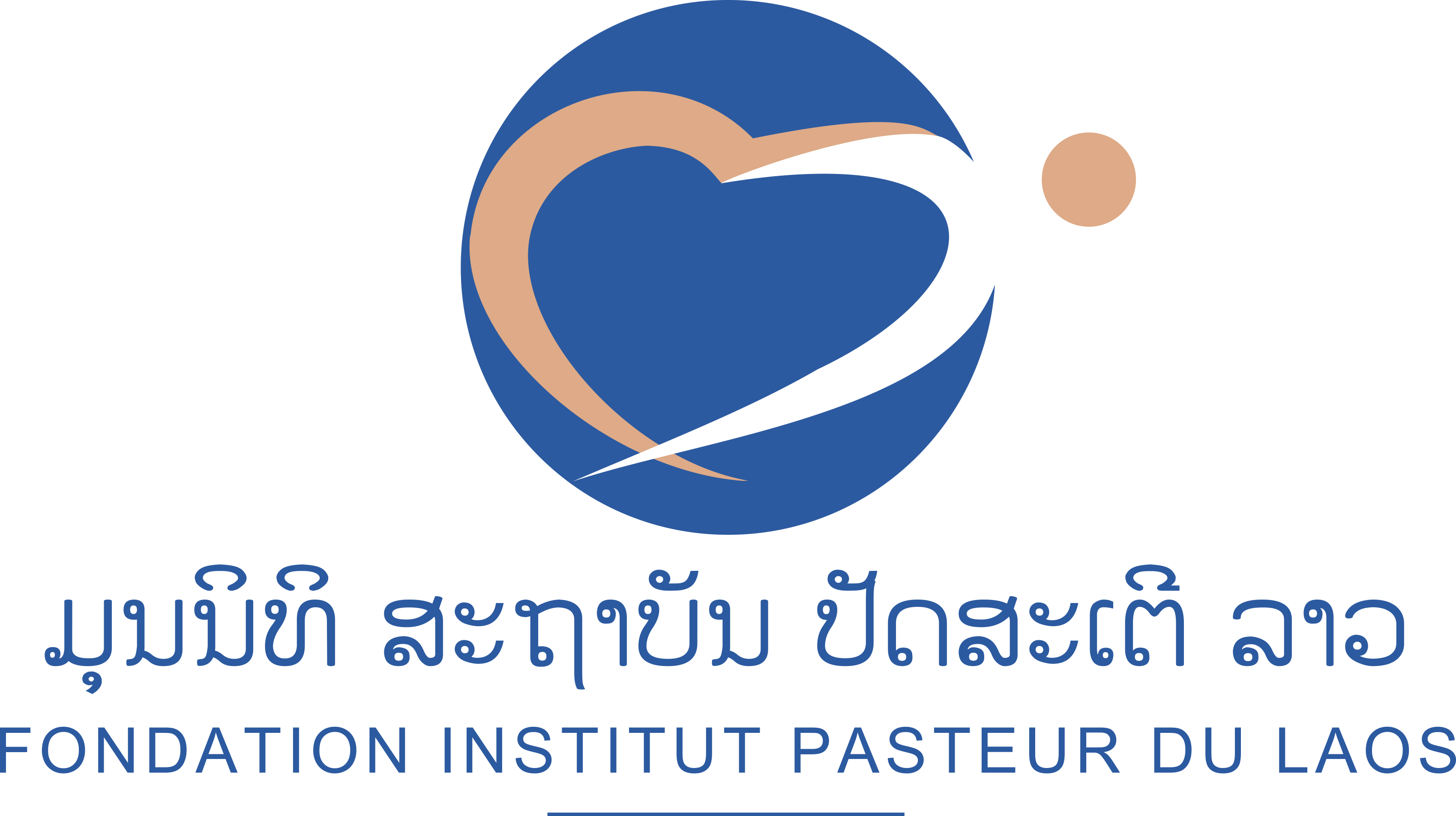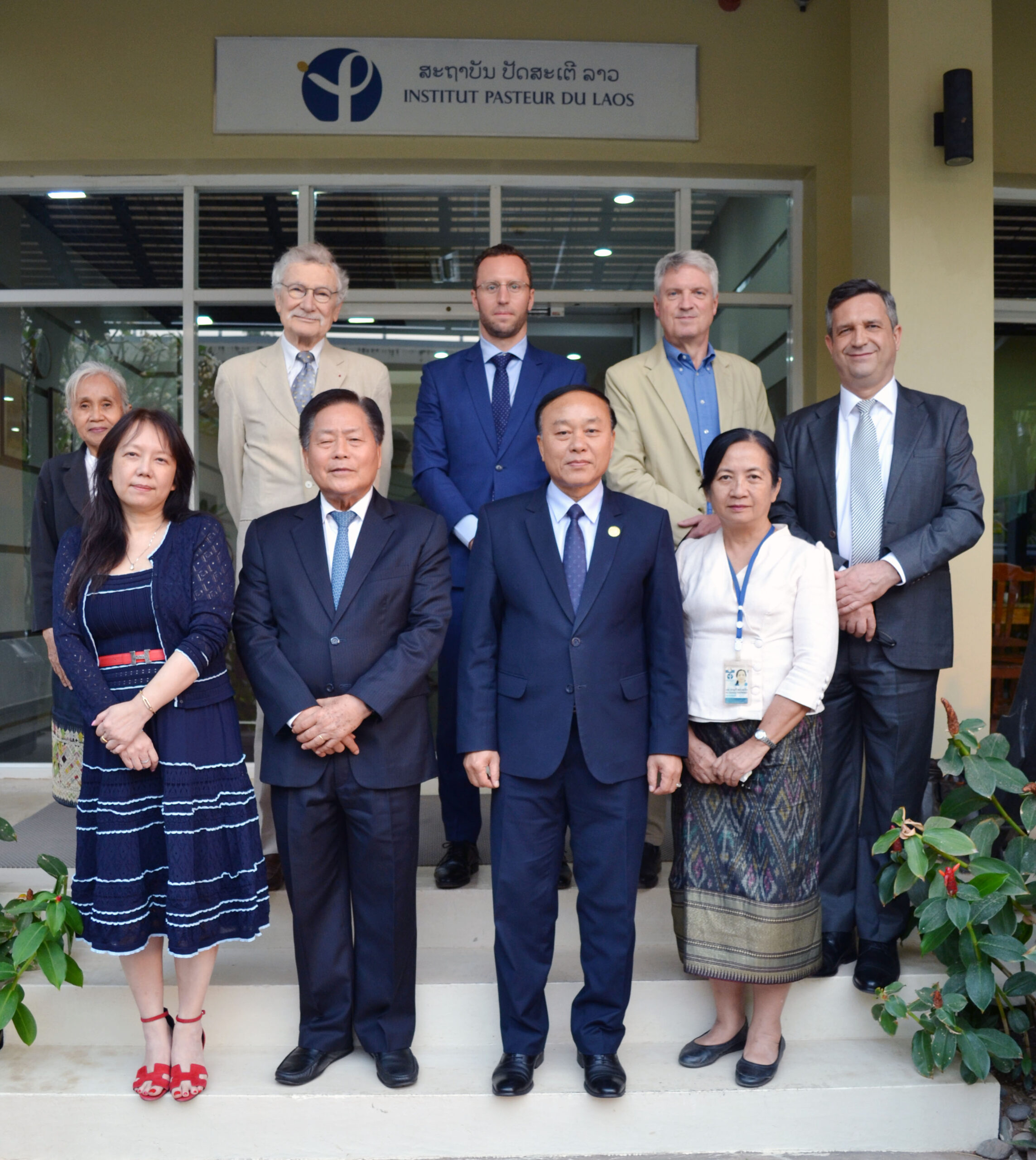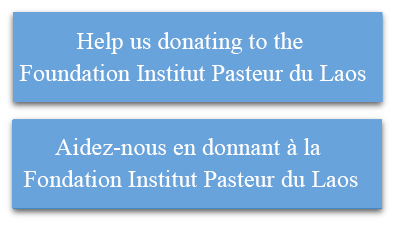SATREPS
 Malaria and Neglected Parasitic Diseases Control and Elimination Using Advanced Research Techniques, Communication Tools and Eco-Health Education in Lao PDR (2023-2028).
Malaria and Neglected Parasitic Diseases Control and Elimination Using Advanced Research Techniques, Communication Tools and Eco-Health Education in Lao PDR (2023-2028).
Collaborations.
Lao PDR.
Center of Malariology, Parasitology and Entomology (CMPE) Department of Communicable Disease Control (DCDC) Lao Tropical and Public Health Institute (Lao TPHI) Faculty of Education of National University of Laos University of Health Sciences (UHS) Several departments and centers in Ministry of Health (MOH), Ministry of Education and Sports (MOES) and Ministry of Agriculture and Forestry (MAF).
Japan.
National Center for Global Health and Medicine (NCGM).
Tokyo Medical and Dental University (TMDU).
Niigata University (NU).
Niigata University of Pharmacy and Medical and Life Sciences (NUPMLS).
University of the Ryukyus (UR).
Shinshu University (SU).
Kumamoto University (KU).
Funding.
Japan International Cooperation Agency (JICA).
Japan Agency for Medical Research and Development (AMED).
Objectives.
Objectives of this project are to accelerate malaria elimination, schistosomiasis (blood fluke) elimination and opisthorchiasis (Liver fluke) control by developing effective testing and infection prevention technologies, improving surveillance systems using communication technologies, and Ecohealth education. And the higher goal of the project is to contribute to the achievement of Universal Health Coverage (UHC) and Sustainable Development Goals (SDGs) Goal 3 “Health and Well-being for All” in Lao PDR.
Background
Science and Technology Research Partnership for Sustainable Development (SATREPS) is a Japanese government program that promotes international joint research for global issues, such as infectious disease control, energy/environment issues, disaster risk reduction, and food security. Malaria is endemic in five southern provinces in Lao PDR which means that 2.6 million people (35.3% of the population) are at risk of the infection.
Morbidity and mortality of malaria have decreased in Lao PDR through the efforts of the Lao government with the support of partners. The Lao government wants to achieve malaria elimination by 2030. However, several obstacles such as drug-resistant malaria, asymptomatic or low-density malaria infections, and poor access to healthcare services in the remote hard-to-access villages are reported.
Neglected Tropical Diseases (NTDs), especially parasitic diseases such as schistosomiasis mekongi, foodborne parasitic diseases, soil-transmitted helminthiasis and lymphatic filariasis have been neglected in Lao PDR (according to the Lao National Policy and Strategies on NTDs Prevention and Control). These diseases have received less attention because they are chronic diseases and endemic only in low-and middle-income countries. However, the impact of such NTDs is devastating both from a public health and economic point of view for the affected people. The project’s objectives are to achieve malaria elimination, and control neglected parasitic diseases (NPDs), such as schistosomiasis mekongi, opisthorchiasis in Lao PDR. By implementing this project, the number of malaria and NPDs cases will be expected to decrease in Laos. The project will contribute to achieving UHC and Goal 3 of the SDGs.
Methodology
Malaria study
A highly sensitive DNA diagnosis using malaria LAMP technology will be installed at local healthcare facilities (i.e., district hospitals) as point-of-care testing and utilized for detecting low-density malaria infections. District hospitals that will implement the malaria LAMP testing will be selected based on malaria endemicity. The malaria LAMP testing enables to diagnosis of all malaria patients (“no one left behind”) who can then benefit from appropriate treatment. Resistance to malaria drugs will also be monitored by in vitro drug-susceptibility test at IPL. Currently, most of malaria cases are reported from remote hard-to-access villages where no mobile phone signal is available.
In such areas, out-of-stock malaria commodities are often reported due to a delay of reporting and procurement. Thus, satellite mobile phones will be distributed to such healthcare facilities (i.e., health centers) to improve malaria surveillance.
Environmental DNA (eDNA) study.
Environmental DNA (eDNA) detection of Schistosoma mekongi and Opisthorchis viverrini by LAMP technology will be developed to allow the creation of infection risk maps for infection prevention. A real-time PCR assay for detecting eDNA of the parasites on site (in the field) by using a portable real-time PCR machine will also be developed. Sites for the eDNA study will be selected in schistosomiasis and opisthorchiasis endemic areas in Khong and Mounlapamok districts, Champasak province.
Pulsed-power technology for inactivation of Opisthorchis viverrini metacercariae.
To prevent opisthorchiasis, a novel pulsed-power technology that inactivates Opisthorchis viverrini metacercariae in freshwater fish will be developed and installed at fresh-market(s) or selected village(s) in Lao PDR. This technology was developed by Kumamoto University, Japan and has already been utilized for a sea-fish parasite (anisakis) inactivation measure in Japan since 2021.
Special food for the snail hosts to kill cercariae or suppress their growth.
For schistosomiasis mekongi and opisthorchiasis prevention, a special food containing spirulina reduces the number of S. mekongi cercariae and O. viverrini cercariae in snail hosts will be developed in Lao PDR. The efficacy of this food in reducing the number of S. mansoni cercariae has already demonstrated in laboratory settings at the Tokyo Medical and Dental University (TMDU).
Capacity development for young Lao researchers.
Capacity development for young Lao researchers is one of the important components of the SATREPS project. The project will provide an opportunity for training courses and studies at universities or research institutes in Japan, including Master’s and PhD courses.
Junior Scientist, Phoyphaylinh PRASAYASITH was selected for a Japanese government scholarship in 2023. She is currently a Research Student at Niigata University, Japan (October 2023-March 2024) and will be a PhD student at Niigata University from April 2024 through March 2027. The SATREPS project will offer PhD course and Master’s course at the University of Ryukyus for two other Lao researchers (Lao TPHI staff and National University of Lao staff, respectively).
Ecohealth education
“Ecohealth education” is based on systems thinking applied to ecosystems. “Ecosystem-thinking” emphasizes an understanding of the whole ecosystem from multiple perspectives that consider mutually dependent relationships.
Most malaria and NPDs patients belong to ethnic minorities who live in remote hard-to-access villages and live in poor hygiene conditions which constitute risk factors for several infectious diseases. Therefore, Ecohealth education for residents of the endemic areas, including people from ethnic minorities, will be developed and conducted to improve their knowledge and capacity for malaria and NPDs prevention and for health-seeking behavior.
At least two villages will be selected for this study in Khong district, Champasak province where annual praziquantel mass-drug administration (MDA) is ongoing. One village will benefit from the intervention (Ecohealth education) and the other village will be a control. The prevalence of parasitic infections among the villagers (children and parents) will be monitored. Knowledge, Attitudes, and Practices (KAP) study will also be conducted in order to evaluate the effect of the intervention.
Conclusion & Perspectives.
A Collaborative Research Agreement (CRA) between IPL and NCGM was signed on 3rd March 2023 by Dr. Paul Brey, director of IPL, and Dr. Norihiro Kokudo, president of NCGM. The Record of Discussion (RD) for the SATREPS project between CMPE and JICA was also signed on 15th March 2023 by Dr. Virasack Banouvong, director of CMPE, and Mr. Toshio Nagase, chief representative of JICA Laos office.
The SATREPS activities supported by JICA were initiated on the 25th of August 2023. Currently, we are preparing for the ethical approval of the SATREPS project and working on the procurement of equipment.






